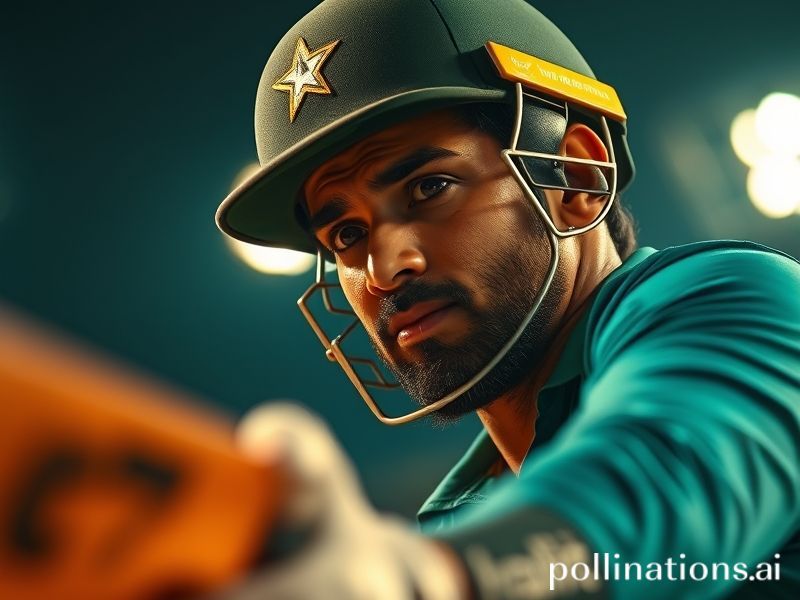Hussain Talat: Pakistan’s Accidental Diplomat Bowling Through a Fractured World
Hussain Talat: The Unlikely Diplomat Carrying Pakistan’s Cricket Bat onto the World Stage
By the time most of us have had our second espresso, Hussain Talat has already been praised, vilified, forgotten, and resurrected on three different continents. Such is the modern fate of a Pakistani all-rounder whose career arc resembles less a tidy sine wave than a seismograph reading during an earthquake drill. Yet Talat, 28, keeps showing up—like a polite dinner guest who realizes the host’s dog has died on the carpet but gamely compliments the hors d’oeuvres anyway.
The numbers are politely modest: 1,200-odd T20 runs at a strike rate that won’t make your accountant spill his chai, and a bowling economy that hovers somewhere between “respectable” and “would you like another fielder on the boundary?” But statistics, like most online dating profiles, lie by omission. Talat’s true value is geopolitical performance art: in a region where visa regimes are tighter than a miser’s fist, he has quietly become Pakistan’s most reliable cultural export, turning up in Caribbean leagues, Canadian exhibitions, and even that curious netherworld known as the Lanka Premier League—cricket’s equivalent of a speakeasy you enter through a laundromat.
To understand the significance, consider the global context. Twenty years ago, Pakistani players were banned from the Indian Premier League after the Mumbai attacks, creating a vacuum that Middle-Eastern franchise leagues now rush to fill like bidders at a bankrupt sheikh’s estate sale. Talat, never quite flashy enough for the IPL gold rush, slipped through the netting and became the everyman emissary in these new outposts. He is the polite reminder that Pakistan still produces cricketers who can speak fluent meme, tweet in emoji, and field like they actually enjoy sunlight—attributes that translate surprisingly well from Dubai to Dallas.
The cynic (hello) might say this is merely late-capitalism laundering nationalism through sport: governments outsource soft power to private leagues that outsource it to athletes who outsource the actual winning to someone else. But Talat’s career offers a darker, funnier subplot. Each boundary he scores is a quiet act of defiance against the travel advisories that treat Pakistani passports like radioactive waste. Each tidy over is a rebuttal to the think-tank white papers insisting the country is one IMF tranche away from becoming a Mad Max set. International relations by other means, indeed—except the means involve a 142-gram slab of willow and the sort of existential optimism usually reserved for people who still believe airline food can improve.
Meanwhile, back home, the domestic circuit remains what travel writers politely call “rugged.” Stadiums flood, selectors feud, and the PCB’s press releases read like absurdist poetry. Talat navigates this with the weary grin of a man who knows tomorrow’s headline will accuse him of either match-fixing or insufficient patriotism, possibly both. Abroad, he is the courteous guest who thanks the hotel for the bomb-sniffing dogs; at home, he is the prodigal son who still has to prove his loyalties every time he forgets to retweet the chairman’s Eid message.
This duality gives Talat an accidental diplomatic portfolio. When he top-scores in the Global T20 Canada, a Punjabi kid in Brampton sees possibility; a cable news anchor in Delhi sees propaganda; and a talent scout in Melbourne sees a bargain. Multiply by whichever currency is collapsing fastest, and you have the modern migrant athlete: simultaneously ambassador, mercenary, and hostage to whichever narrative needs him that afternoon.
As another World Cup looms—those quadrennial festivals where entire nations discover their inner divorce lawyer—Talat will likely hover on the periphery of Pakistan’s squad, ready to be summoned like a substitute teacher who actually knows calculus. Whether he swings the semi-final or drops the catch that launches a thousand op-eds is almost beside the point. In a fracturing world that outsources its emotions to sports analytics, Hussain Talat remains a rare constant: proof that you can still travel on talent, even when your baggage includes a whole subcontinent’s worth of historical grievances. And if the universe has any sense of cosmic irony left, he’ll probably end up coaching peace-building cricket clinics in Kabul—because of course he will.







